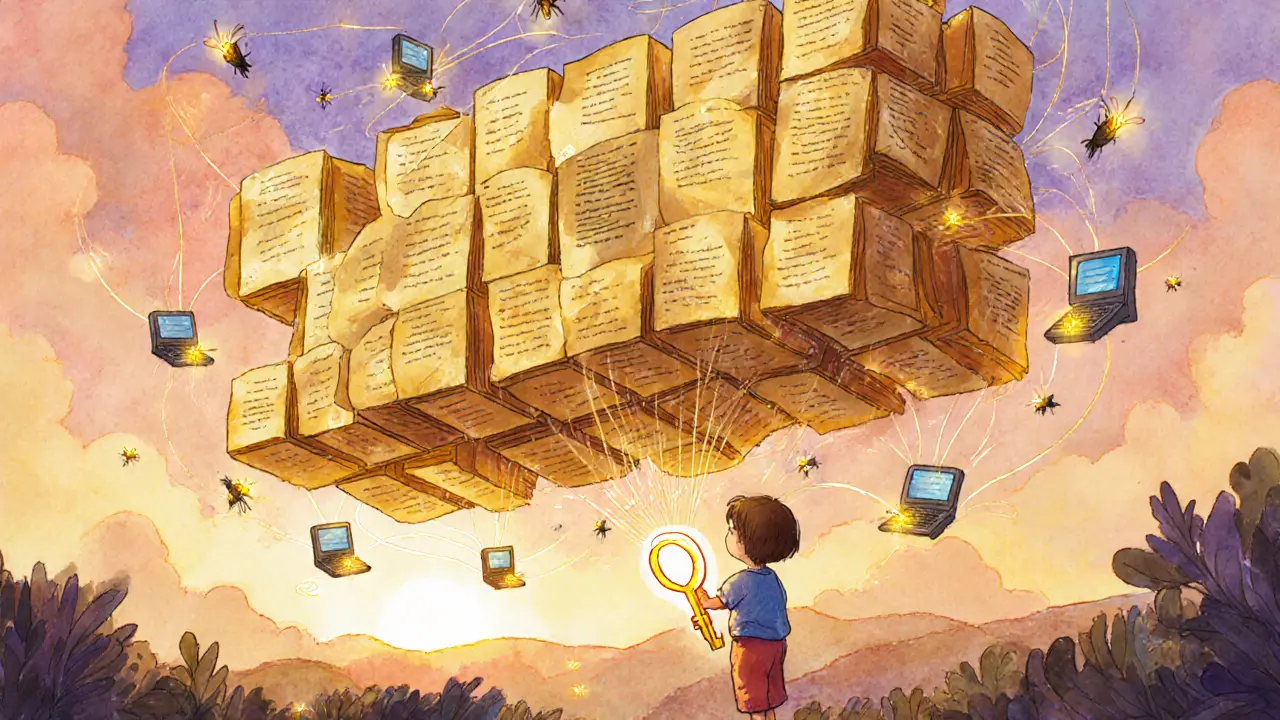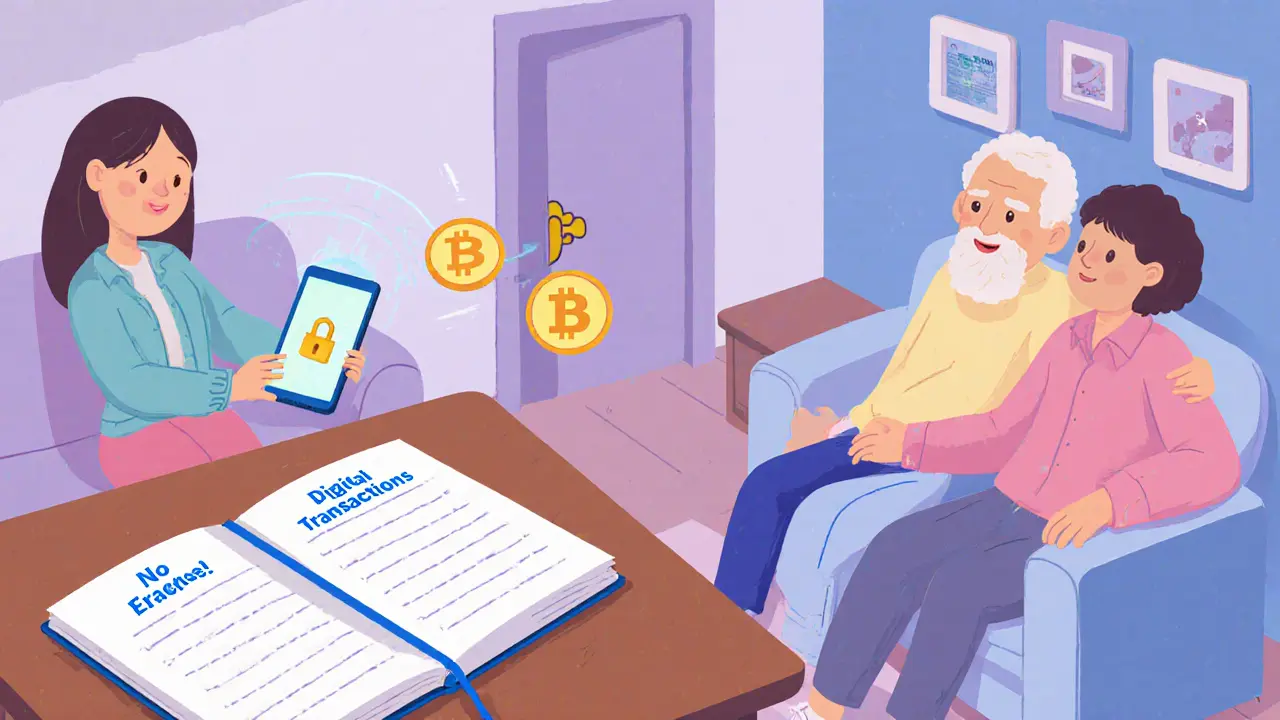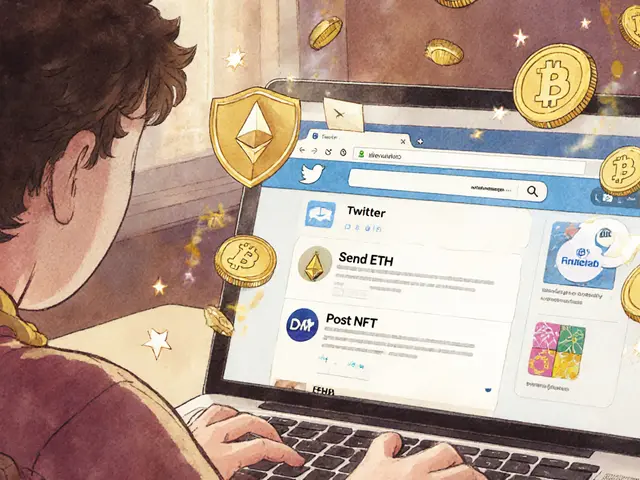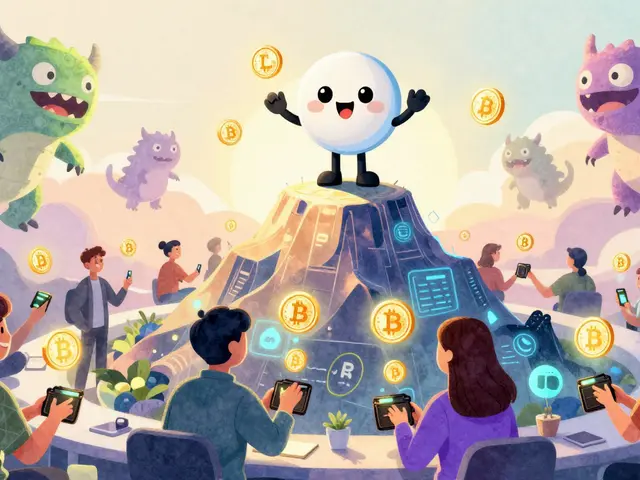
Crypto Transaction Fee & Energy Calculator
Transaction Calculator
Important: Transaction fees vary based on network congestion. The values shown are estimates based on current network conditions.
Imagine sending money to someone halfway across the world without a bank, without fees, and without waiting days for it to clear. That’s what cryptocurrency lets you do - but how? It’s not magic. It’s not even that complicated once you break it down.
It’s Digital Money, But Not Like Your Bank Account
When you have $100 in your bank account, the bank keeps a record saying you own it. If the bank goes down, you might lose access. Cryptocurrency is different. There’s no bank. No person in charge. Instead, your money exists as a digital entry on a public list - a blockchain - that thousands of computers around the world all keep updated at the same time.
What you actually own isn’t a coin you can hold. It’s a digital key. That key lets you prove you control a certain amount of cryptocurrency and move it to someone else. No one else can spend it. Not even the person who created it. Only you, with your key, can do that.
How Transactions Actually Happen
Let’s say you want to send 0.5 Bitcoin to a friend. Here’s what happens:
- You open your digital wallet and type in their public address (like an email for crypto).
- You sign the transaction with your private key - your secret password that never leaves your device.
- The network hears your request. Every computer on the network sees it.
- Your transaction joins a group of other pending ones - like a queue.
Now comes the part most people find confusing: mining.
Miners are people (or companies) with powerful computers. Their job is to check that your transaction is real - that you actually own the Bitcoin you’re trying to send, and that you haven’t already spent it. They bundle your transaction with others into a block.
To add that block to the blockchain, they have to solve a super hard math puzzle. It’s not about being smart. It’s about brute force - guessing the right answer by trying billions of combinations. The first miner to solve it gets to add the block. And as a reward, they get newly created Bitcoin (or other crypto) plus small fees from the transactions in that block.
Once that block is added, your transaction is confirmed. But most people wait for six more blocks to be added after yours. Why? Because the more blocks on top of yours, the harder it becomes to change it. That’s how the system stops fraud.
What Is a Blockchain? (No Jargon, Promise)
Think of a blockchain like a digital notebook that everyone can see, but no one can erase.
Each page is a block. Each block holds a list of transactions. When a new page is filled, it’s glued to the last one - with a unique code that links it to the previous page. If someone tries to change one transaction on page 10, the code on page 11 breaks. And since every computer in the network has a copy of the whole notebook, they all notice the mismatch. The fake version gets thrown out.
This is why blockchain is called tamper-proof. It’s not because the code is unbreakable. It’s because changing one thing means changing everything after it - and you’d need to control more than half the computers on the network to do it. That’s nearly impossible.

How Is New Crypto Created?
Bitcoin is created through mining. But not all cryptocurrencies work that way.
Bitcoin uses something called proof of work. It’s like a race where the fastest computer wins new coins. But it uses a lot of electricity. A single Bitcoin transaction can use as much power as an average household in New Zealand does in a week.
That’s why newer cryptos like Ethereum (after its 2022 upgrade) switched to proof of stake. Instead of racing to solve puzzles, you lock up (or “stake”) your own crypto as collateral. The network picks validators randomly based on how much they’ve staked. If they act honestly, they earn rewards. If they cheat, they lose their stake. It’s faster, cheaper, and uses 99% less energy.
Some coins are even created all at once and distributed to early users. Others are given out as rewards for using a certain app or service. The method depends on the project - but the goal is always the same: get people to use and trust the system.
Why Should You Care About Cryptocurrency?
It’s not just about making money. Cryptocurrency is a new way to handle value - one that doesn’t need permission from banks, governments, or corporations.
Think about sending money to family overseas. Traditional services like Western Union charge 5-10% and take days. With crypto, you can send it in minutes for less than a dollar - even if you’re in a country with weak banking.
Or imagine getting paid for freelance work. No more waiting for bank transfers. No more chargebacks. You get paid instantly, directly, and irreversibly.
And beyond money, blockchain lets you build things like automated contracts. If you rent an apartment, the lock could open automatically when your payment hits the blockchain. No landlord needed. No paperwork. Just code.

It’s Not All Perfect - Here’s the Real Talk
Cryptocurrency is powerful, but it’s not risk-free.
Prices swing wildly. Bitcoin jumped 120% in one year, then dropped 60% the next. If you’re looking for a safe investment, this isn’t it. It’s more like buying rare art - you might get lucky, or you might lose everything.
And if you lose your private key? Gone forever. No customer service. No password reset. Your money is locked in a digital vault - and only you have the key.
Scams are everywhere. Fake wallets. Fake exchanges. Fake influencers promising “guaranteed returns.” If it sounds too good to be true, it is.
Big companies like FTX collapsed in 2022, wiping out billions. That didn’t break Bitcoin, but it scared a lot of people. The truth? Most crypto projects will fail. Only a handful will survive.
Where Do You Start?
You don’t need to mine. You don’t need to understand every line of code. Start simple.
- Get a wallet. Try Trust Wallet or Phantom - they’re easy and secure.
- Buy a small amount of Bitcoin or Ethereum from a reputable exchange like Coinbase or Kraken.
- Send it to your wallet. Don’t leave it on the exchange.
- Hold it for a while. Don’t check the price every hour.
Learn by doing. Try sending $10 to a friend. Watch how it moves. See how long it takes. Notice the fee. That’s how you learn.
Most people who succeed in crypto aren’t traders. They’re just people who understood the basics, stayed calm during the ups and downs, and didn’t chase hype.
What’s Next?
Cryptocurrency isn’t going away. Banks are testing their own digital currencies. Governments are exploring blockchain for voting and land records. Even your grocery store might one day accept crypto directly.
It’s still early. But the foundation is solid: decentralized, secure, global, and open to anyone with an internet connection. You don’t need to be a tech expert to use it. You just need to understand the basics - and respect the risks.
That’s it. That’s how cryptocurrency works. No hype. No fluff. Just the truth.
Can cryptocurrency be hacked?
The blockchain itself has never been hacked. But wallets, exchanges, and apps built on top of it can be. If someone steals your private key, they can take your crypto. Always use a hardware wallet for large amounts and never share your recovery phrase.
Is cryptocurrency legal?
Yes, in most countries including New Zealand, the U.S., and the EU. But regulations vary. Some places tax it as property, others treat it like currency. Always check local laws before buying or selling.
Do I need to pay taxes on cryptocurrency?
Yes. In New Zealand and most countries, selling crypto for profit, trading one coin for another, or using it to buy goods is a taxable event. Keep records of every transaction - buys, sells, trades, and gifts.
What’s the difference between Bitcoin and other cryptocurrencies?
Bitcoin is the first and most well-known. It’s designed as digital gold - a store of value. Other cryptos like Ethereum let you run apps and smart contracts. Some are made for fast payments, others for privacy or gaming. Bitcoin is the benchmark; others are experiments.
Can I mine cryptocurrency at home?
Technically yes, but it’s not worth it for Bitcoin anymore. Mining requires expensive hardware and uses massive electricity. For most people, buying crypto on an exchange is far cheaper and easier. Mining makes sense only for a few coins like Monero or if you have access to cheap power.
How do I keep my cryptocurrency safe?
Use a hardware wallet like Ledger or Trezor for anything over a few hundred dollars. Never store large amounts on exchanges. Write down your recovery phrase on paper - don’t save it digitally. Enable two-factor authentication on your exchange account. And never click links from strangers promising free crypto.
16 Comments
Write a comment
More Articles

What is Mask Network (MASK) Crypto Coin? A Practical Guide to Web3 on Social Media
Mask Network (MASK) lets you send crypto, share NFTs, and message privately directly on Twitter and Facebook. Learn how it works, why it's different from MetaMask, and whether it's worth using in 2025.


sandeep honey
November 15, 2025 AT 00:33Crypto isn't magic it's math and incentives. Miners get paid to verify transactions so they have skin in the game. No central authority means no single point of failure. That’s the whole point.